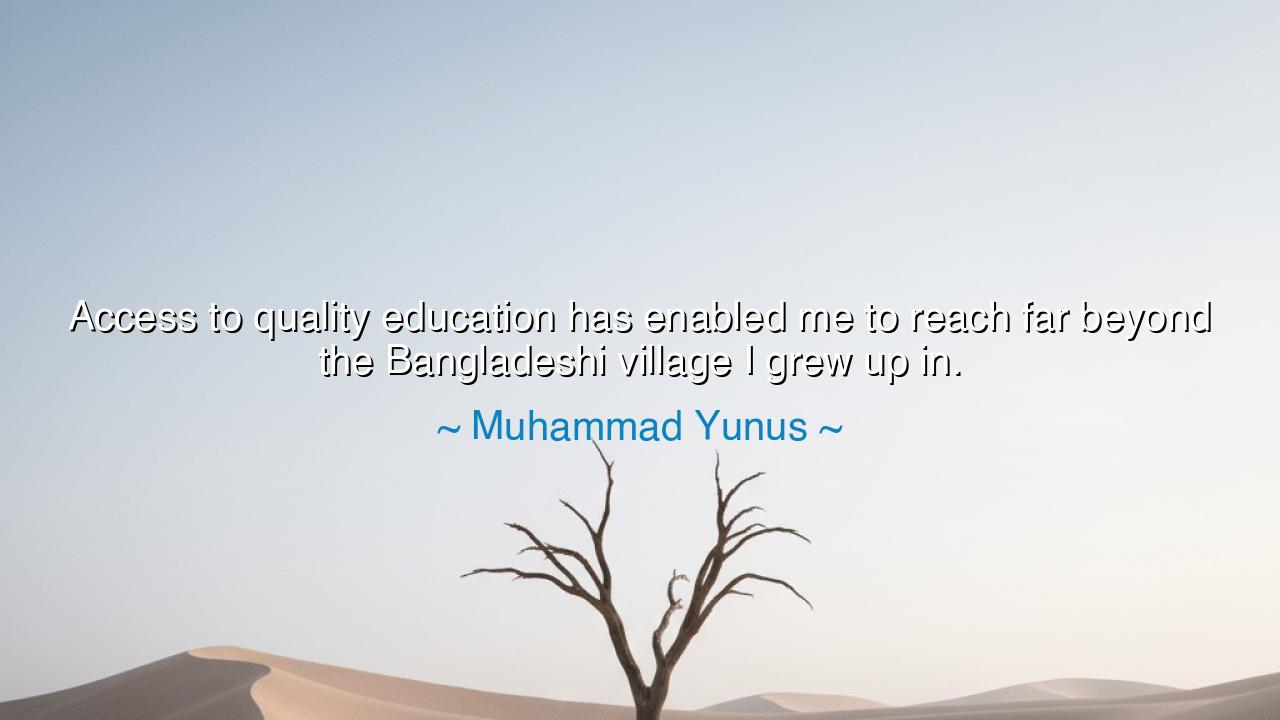
Access to quality education has enabled me to reach far beyond
Access to quality education has enabled me to reach far beyond the Bangladeshi village I grew up in.






Muhammad Yunus, the banker of the poor and a prophet of dignity, once said with humble strength: “Access to quality education has enabled me to reach far beyond the Bangladeshi village I grew up in.” In this confession lies a truth that stretches beyond one life, beyond one nation, beyond one age: that education is the bridge that carries the child from the narrow limits of circumstance to the wide horizons of destiny. Without that bridge, the poor remain bound to the soil of their birth; with it, they may step into worlds their ancestors never dreamed of.
The meaning of these words is both simple and profound. Yunus reminds us that education is not merely the learning of letters or numbers—it is liberation. It breaks the chains of poverty, silences the whispers of inferiority, and opens doors locked for generations. For a boy born in a humble village, where fields and hunger marked the boundaries of life, the gift of quality education gave wings to his spirit. It did not erase his roots, but it allowed him to carry them with honor into places of power, where he could serve not only himself but all who shared his beginning.
The origin of Yunus’s testimony lies in the soil of Bangladesh itself. He grew up in a land scarred by poverty and limited opportunity, yet he was given the chance to study. From that beginning, he traveled far, becoming a teacher, a thinker, and finally the architect of microcredit—a system that restored dignity and power to the poorest of the poor. His journey from village boy to Nobel laureate was not paved with wealth or privilege, but with the steady stones of education, each step taking him further beyond the walls that might have confined him.
History resounds with such stories. Consider Abraham Lincoln, who was born in a log cabin in the wilderness of America. With only a few borrowed books and a hunger for learning, he taught himself by firelight. His humble schooling became his ladder, lifting him from obscurity to the presidency. From his desk in the White House, he changed the fate of a nation. Like Yunus, his life proclaimed that education is the great equalizer, the force that allows the lowliest to rise, not only for themselves, but for the sake of many.
Yunus’s words also remind us that education is not only personal—it is generational. When one child from a village is given the chance to learn, that knowledge does not stop with him. It flows outward like a river, nourishing family, community, and nation. The boy who studies may one day become the leader who lifts thousands, the teacher who inspires, the builder who transforms the land. This is why access to quality education is not charity, but justice, not luxury, but necessity.
The lesson is clear: no society can rise higher than the education it offers its children. To deny a child education is to chain them to the accident of their birth. To grant them education is to give them the key to freedom. If you wish to build a strong community, if you wish to lift the poor, if you wish to heal injustice—begin with schools, with teachers, with books. Begin with the light of learning, for it burns away the darkness of limitation.
So what must you do? Support the schools in your land. Demand quality education for all, not only for the privileged. Share knowledge freely, mentor the young, and lift up those who hunger to learn. And if you yourself have been blessed with education, do not hoard it for personal gain—use it as Yunus did, to serve others, to reach beyond your village, and to open the way for others to follow.
Thus, remember Yunus’s testimony: “Access to quality education has enabled me to reach far beyond the Bangladeshi village I grew up in.” Let his journey remind you that education is not only the lifting of one life, but the rising of a people. Cherish it, protect it, and extend it to all, for it is the bridge from poverty to promise, from obscurity to greatness, from the narrow path of survival to the wide road of human flourishing.






AAdministratorAdministrator
Welcome, honored guests. Please leave a comment, we will respond soon